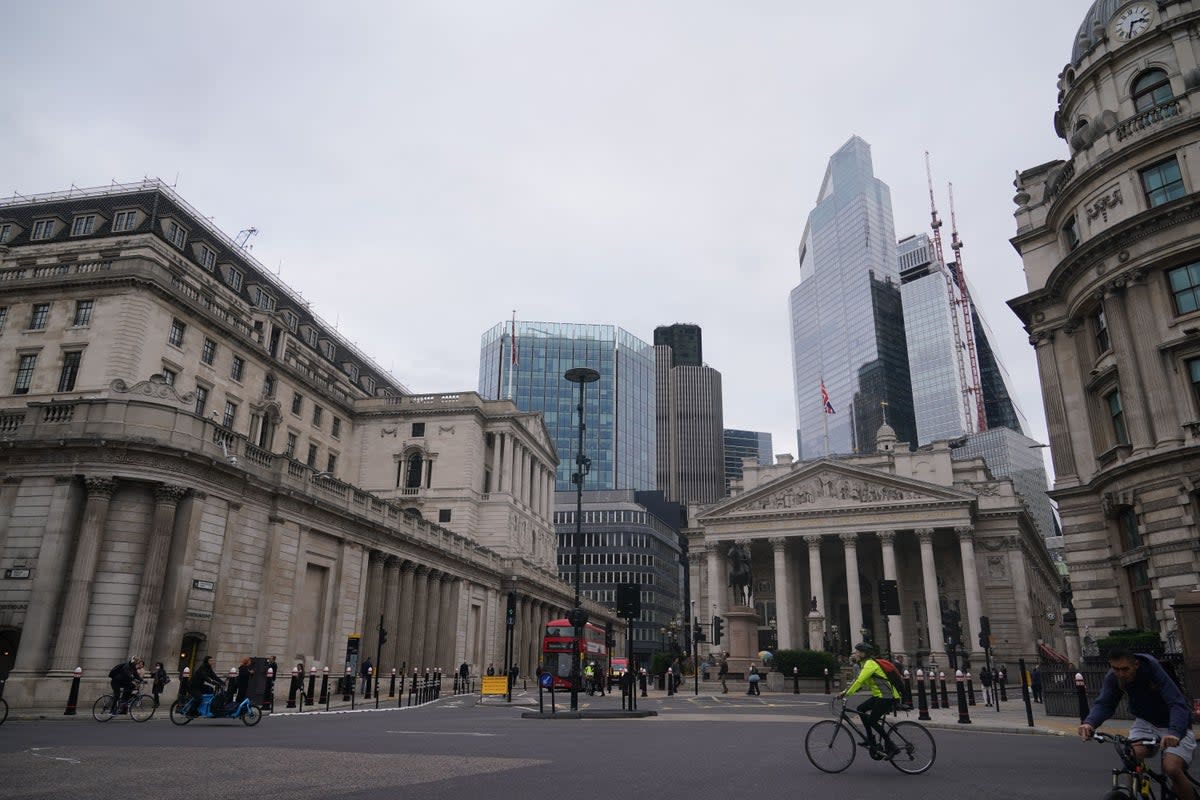FTSE steady after Friday’s sell-off despite record-low pound

The pound hit headlines again on Monday after plummeting to a record low against the dollar overnight, sending shockwaves across the economy, but London’s leading index remained fairly unchanged.
Sterling hit its lowest level against the dollar since decimalisation in 1971, falling by more than 4% to just 1.03 dollars in early Asia trading.
It regained ground later on in the day, recovering to around 1.07 dollars when European markets closed, despite the Bank of England quashing speculation that it might announce an emergency interest rate hike to steady the pound.
Governor Andrew Bailey confirmed late on Monday that it would be assessing the impact of the fall in sterling and the Government’s announcements at its next scheduled meeting.
While the pound plummeted, the FTSE 100 was relatively stable by the time markets closed on Monday. A weaker pound is usually good news for the internationally-focused index as it means British products are cheaper for overseas buyers.
The index hit lows of around 6,939 in the morning but was 2.35 points higher, or 0.03%, at 7,020.95 when European markets closed.
But the index is still just above recent lows. On Friday it fell by as much as 2.5%.
The tanking pound reflects a dip in overseas confidence in the British currency after the Government announced plans to raise borrowing and cut taxes.
Economists have been speculating over the potential impact of another rate hike, or lack thereof.
Neil Wilson, chief market analyst for Markets.com, said: “If there is not also an accompanying rate hike, it could lead to severe disappointment and fresh sterling selling given the clawback we have seen since the Asian session lows.
“The risk is that the Bank of England hikes big and sterling still drops, and then what does it do?
“Intervention is beset with risks; the yen is already back to where it was before the Bank of Japan intervened last week.
“Stopping gilt sales would be a potentially savvy move that avoids the need to go down the rate-hike rabbit hole.”
Others added that the currency volatility has put the new Government’s fiscal policies firmly under international scrutiny.
Joshua Mahony, senior market analyst at online trading platform IG, said: “With Truss and Kwarteng in the job for less than a month, the past week has been a swift reminder that they have very little room for mistakes when seeking to implement a whole raft of fiscal policies.
“The strength of the pound may be a reaction to the anticipated emergency rate hike from the Bank of England, but the risk here is that markets begin to realise the UK’s reserves make defending the pound increasingly difficult.”
In the US, its top markets were down in early trading despite the strengthening of the dollar. The S&P 500 was down by 0.47% and Dow Jones had dropped by 0.6%.
Elsewhere in Europe, the German Dax was down by 0.46% and the French Cac 40 had dipped by 0.24%.
Meanwhile, wholesale gas prices slipped early on Monday with Brent crude oil slipping below 85 dollars per barrel for the first time since January. When European markets closed, Brent crude was 1.23% lower, at 85.09 dollars per barrel.
In company news, the boss of Unilever announced plans to stand down at the end of 2023 after five years as chief executive and 35 years with the group.
The FTSE-100 listed company said it has begun looking for Alan Jope’s successor. Shares in the company were up by 1.83% on Monday.
Meanwhile, shares in UK car dealership Pendragon were up by 19% on Monday after the group announced a preliminary takeover offer from its largest shareholder, Hedin Group.
The Swedish motor company could buy out the entirety of Pendragon’s share capital at 29 pence per share, in a deal valued at around £400 million.
On the flip side, resale platform Music Magpie saw its shares plummet by around two-thirds after it downgraded its profit and revenue expectations as it prepares for a worse-than-anticipated Black Friday sales period. Shares were down by 68% when markets closed.
The biggest risers on the FTSE 100 were Hargreaves Lansdown, up 35p to 869.6p, Fresnillo, up 24p to 714.2p, Entain, up 37p to 1,120p, Sage Group, up 23.2p to 713.2p, and 3I Group, up 35.5p to 1,123p.
The biggest fallers on the FTSE 100 were Taylor Wimpey, down 7.31p to 95.84p, Persimmon, down 89.5p to 1,260.5p, Barratt Developments, down 20.8p to 385.2p, Berkeley Group, down 169p to 3,315p, and Segro, down 31.2p to 737.6p.

 Yahoo News
Yahoo News 
